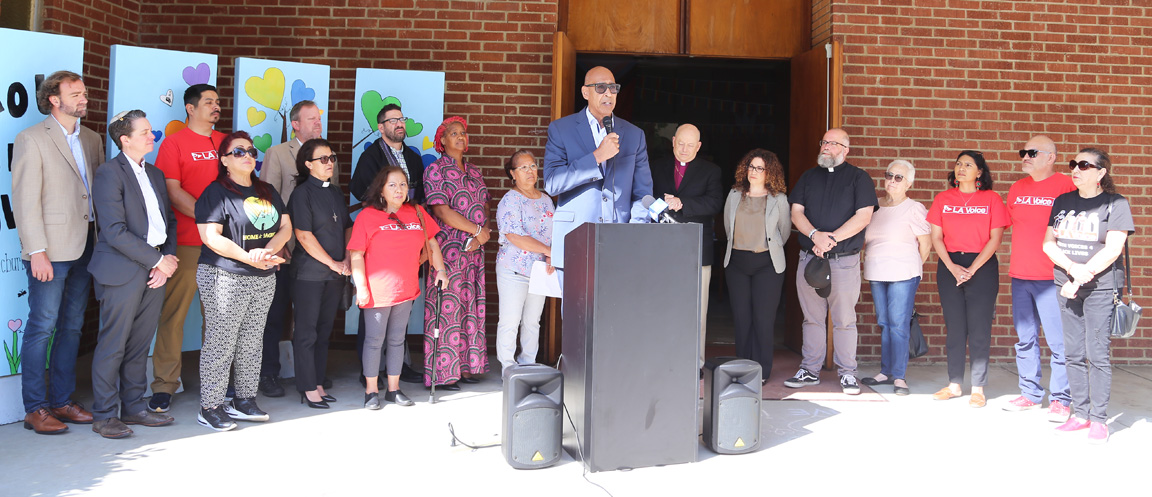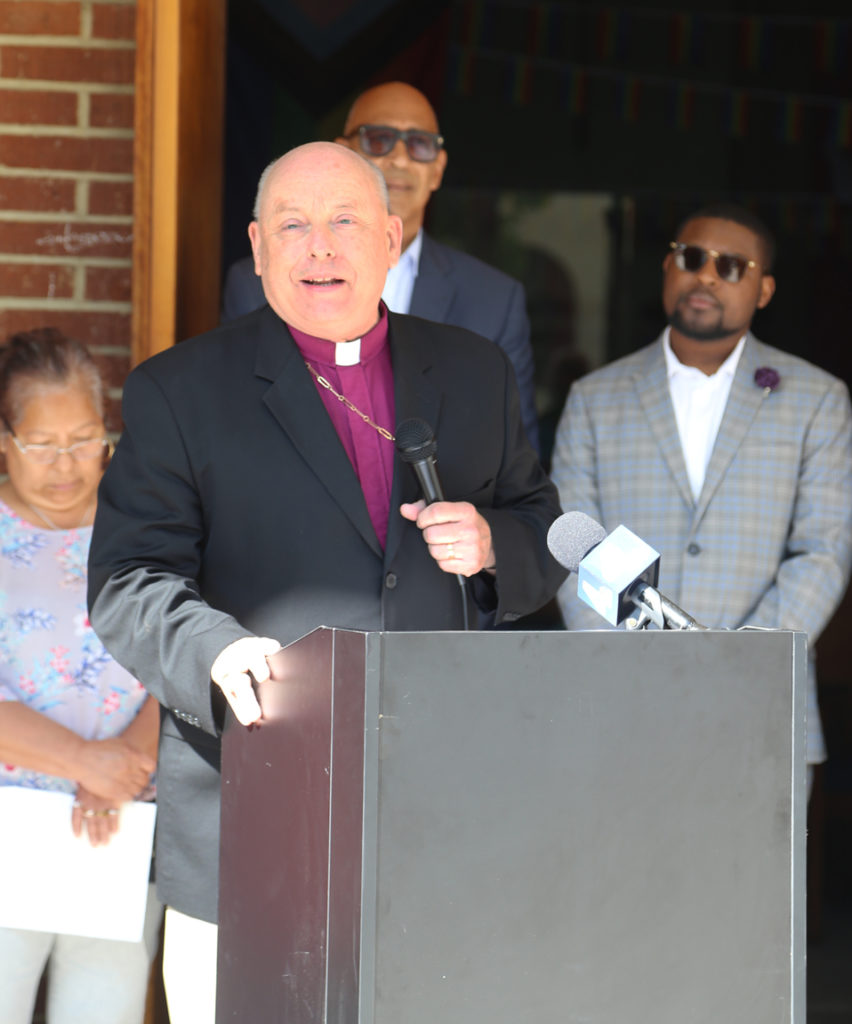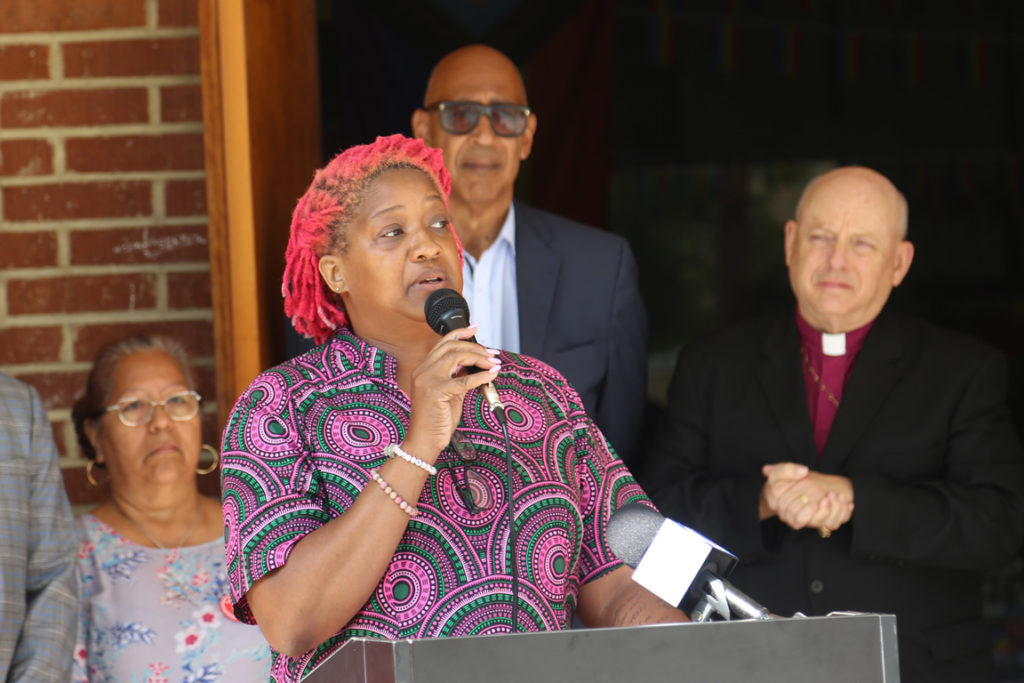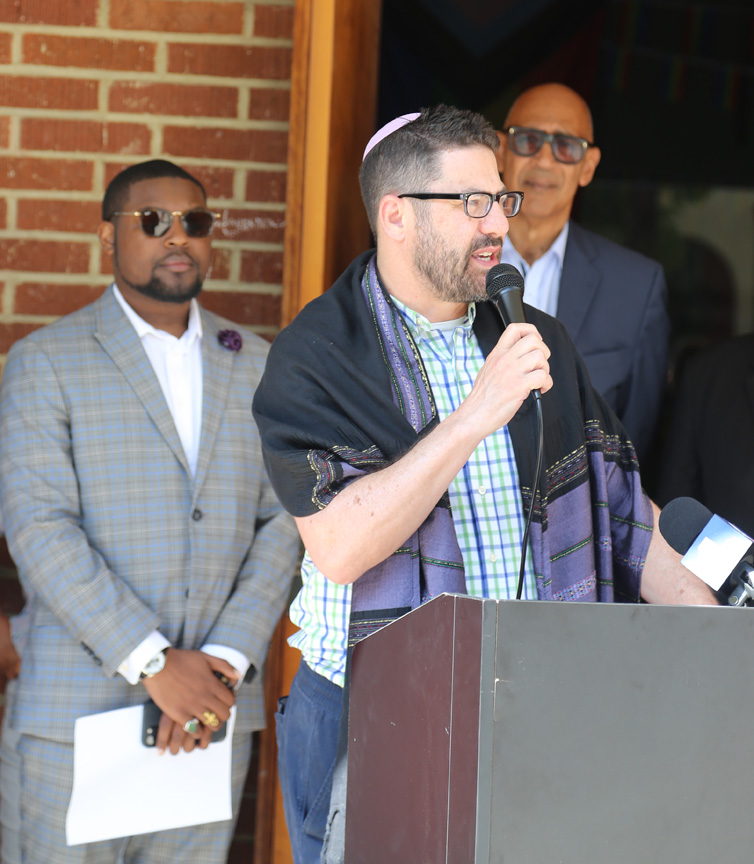
State assembly member Chris Holden, accompanied by other civic and faith leaders, addresses a July 3 press conference encouraging support for legislation to solve California’s housing problem. Photos: Janet Kawamoto

Bishop John Harvey Taylor describes plans to build affordable housing on 25% of church properties in the Episcopal Diocese of Los Angeles.
[The Episcopal News] “Our society is rich enough that no one should have to sleep on the street or go hungry. It’s that simple,” Bishop John Harvey Taylor of the Episcopal Diocese of Los Angeles said at a July 3 press conference of civic and religious leaders organized by LA Voice, an interfaith justice advocacy group, and held at First Christian Church of Burbank.
“There are other problems to solve,” Taylor continued, standing next to Assemblymember Chris Holden (41st Assembly District), a representative from State Senator Maria Elena Durazo, and leaders of local Christian, Jewish and other faith groups. “We can care for people when they’re addicted or ill instead of putting them on the street or putting them in jail. But let’s start with a blanket and a crust of bread. We can do that; everyone with something to eat and a place to lay their head. Call that a bare minimum for a society to be called civilized.
“It’s the day before Independence Day, and we need to declare independence from homelessness in our region.”
The 2023 Greater Los Angeles Homeless Count results, released June 29, showed “a 9% rise in homelessness on any given night in Los Angeles County to an estimated 75,518 people and a 10% rise in the City of Los Angeles to an estimated 46,260 people,” according to the Los Angeles Homeless Services Authority, which conducts an annual count of homeless people in the city. “While this year’s increases are slightly lower than previous year-over-year increases in the homeless count, they continue a steady growth trend of people experiencing homelessness in the annual Point-in-Time Count (PIT Count).”
Other major cities in California have seen similar increases: homelessness is up 26% in San Bernardino; 12% in Riverside.
Taylor reiterated the Diocese of Los Angeles’ pledge to build affordable housing on 25% of its properties. One such project is already open at St. Michael’s Ministry Center, Riverside; another, at Blessed Sacrament Church, Placentia, is nearing completion; more are in the planning stages.
Holden noted that homelessness and the cost of housing are not new issues in California and elsewhere. “The housing crisis is multifaceted and needs a local state and federal response. Housing is not just about roofs over people’s head, but it’s a place where you can envision your future. Whether you are moving into a college dorm, signing an apartment lease, or getting keys as a first-time homebuyer, that experience of having a home is something every Californian deserves.”

Homelessness is an issue of political will, Najuma Smith Pollard told the July 3 gathering.
He emphasized the need to care for people with mental illness, which he said is a leading factor in homelessness. “Providing housing for unhoused people shows the moral character of a community, a city, a county and a state.” He described proposed legislation that will finance additional housing, provide increased care for homeless veterans, and smooth the way for building affordable housing on land owned by
faith-based institutions and nonprofit colleges. He commended Mayor Karen Bass of Los Angeles for her “Inside Safe” program that, he said, has moved more than 14,000 people off the street during the first six months of her administration.
A spokeswoman read a statement from Senator Durazo calling for state and city governments to increase efforts to prevent people from becoming homeless while continuing to find housing for those already on the streets.
The Rev. Najuma Smith Pollard, pastor of Word of Encouragement Church, Los Angeles, and member of the L.A. Voice board, reminded hearers that ending homelessness is possible. “We are not facing an issue of wealth,” she said. “We’re not facing an issue of space. We’re not even facing an issue of strategy. This is an issue of will.” The system needs to change, she said, noting that many low-income people can’t come up with the three months’ rent often required to move into an apartment, and are therefore forced onto the streets.
Everyone in the community is a stakeholder in this issue, she said. “Because if we don’t rise up with the proper will, it will come to your front door. It will be in your house; it will be in your back yard; it will be in your front yard.”

Rabbi Joshua Levine Grater, executive director of Pasadena’s Friends in Deed, points out that keeping people in their homes is far less expensive than getting them back into apartments after they have become homeless.
Rabbi Joshua Levine Grater, executive director of Pasadena’s Friends in Deed, said that keeping people from becoming homeless is key. “It is incredibly more expensive, and totally less efficient, to allow someone to become homeless, rather than keeping them in their home,” he said. “Six, seven, eight times as much money is going to be spent once people become homeless rather than offering them 3000, 4,000 dollars to help supplement their rent for a few months.” Too many people, he said, are one paycheck, one illness, or one car breakdown away from eviction and homelessness.
Roman Catholic priest Brendan Busse, pastor of Dolores Mission, introduced Socorro Vasquez, a fellow leader of L.A. Voice, who spoke emotionally in Spanish about members of her family being evicted from their home.
Busse concluded, “We must acknowledge the truth that home is sacred, that our dwelling places are places of God, that we must do everything we can to help people stay in those homes. … So we say this morning and every morning: no more evictions, no more pushing people into the streets. And that work is worthy of us because home is sacred.”
“Home is sacred!” repeated the assembled leaders. “Home is sacred.”
